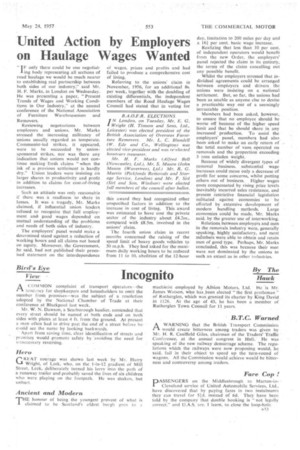United Action by Employers on Haulage Wages Wanted
Page 71

If you've noticed an error in this article please click here to report it so we can fix it.
" IF only there could be one negotiat ing body representing all sections of road haulage we would be much nearer to establishing real partnership between both sides of our industry," said Mr. H. F. Marks, in London on Wednesday. He was presenting a paper, "Present Trends of Wages and Working Conditions in Our Industry." at the annual conference of the National Association of Furniture Warehousemen arid Removers.
Reviewing negotiations between employers and unions. Mr. Marks stressed the increasing militancy of unions usually regarded as temperate. Communist-led strikes, it appeared, were to be succeeded by unionsponsored strikes, nor was there any indication that unions would not continue making fresh claims "when the ink of .a previous settlement is hardly dry." Union leaders were insisting On larger shares in productivity and profit in addition to claims for cost-of-living increases.
Such an attitude was only reasonable if there was a readiness to share in losses. It was a tragedy, Mr. Marks claimed, if influential union leaders refused to recognize that full employment and. good wages depended on mutual understanding of the problems and needs of both sides of industry. The employers' panel would make a determined stand against a reduction of working hours and all claims not based on equity. Moreover, the Government, he said, had not published their promised statement on the interdependence of wages, prices and profits and had failed to produce a comprehensive cost of living.
Referring to the unions' claim in November, 1956, for an additional 8s. per week, together with the doubling of existing differentials, the independent members of the Road Haulage Wages Council had stated that in voting for
this award they had recognized other unspecified factors in addition to the increase in cost of living. This award was estimated to have cost the private sector of the industry about £4.2m., compared with 0.5m. involved in the unions' claim, The fourth union claim in recent months concerned the raising of the speed limit of heavy goods vehicles to 30 m.p.h. They had asked for the maximum daily working hours to be reduced from 11 to 10. abolition of the 12-hour day, limitation to 200 miles per day and a 161 per cent, basic wage increase. Realizing that less than 10 per cent. of independent operators would benefit from the new Order, the employers' panel rejected the claim in its entirety, the terms of the claim cancelling out any possible benefit.
Whilst the employers stressed that individual agreements could be arranged between employers and drivers the unions were insisting on a national settlement. But, so far, the unions had been as unable as anyone else to devise a practicable way out of a seemingly intractable position.
Members had been asked, however, to ensure that no employee should be worse off because of the higher speed limit and that he should share in any increased production. To assist the employers' panel, members had also been asked to make an early return of the total number of vans operated on removals and the proportion exceeding 3 tons unladen weight.
Because of widely divergent types of removal business, substantial wage increases could mean only a decrease of profit for some concerns, whilst putting others out of business. Higher wages costs compensated by rising price levels inevitably incurred sales resistance, and present restrictive financial legislation militated against economies to be effected by extensive development of modern handling methods. Large economies could be made, Mr. Marks said, by the greater use of interworking. Relations between employers and men in the removals industry were, generally speaking, highly satisfactory, and most m6mbers were able to obtain and retain men of good type. Perhaps, Mr. Marks concluded, this was because their men were not dominated by the unions to such an extent as in other industries.








































































































































